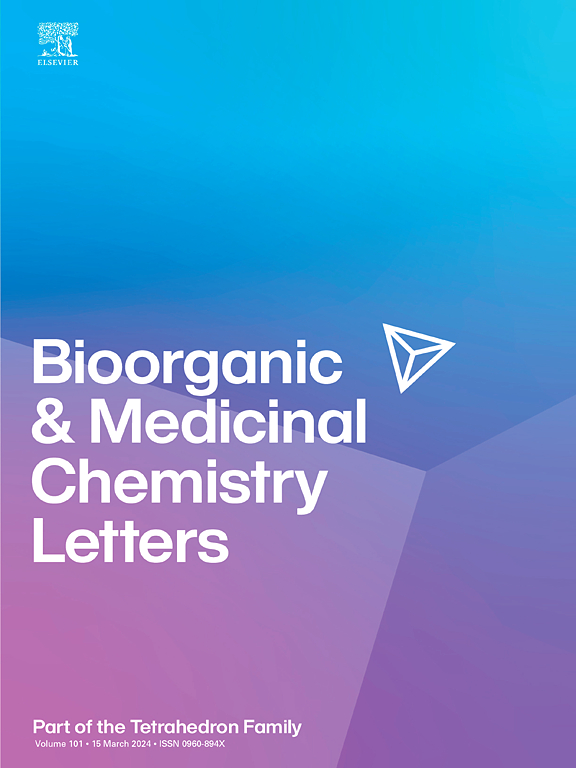发现新的香豆素磺酸盐作为微管蛋白聚合抑制剂,靶向秋水仙碱结合位点,具有有效的抗癌活性。
IF 2.5
4区 医学
Q3 CHEMISTRY, MEDICINAL
引用次数: 0
摘要
利用分子杂交技术构建了一系列新的香豆素磺酸衍生物作为微管靶向抑制剂,并对MGC-803、KYSE450和HCT-116癌细胞进行了抑癌活性评价。其中,化合物C20对KYSE450细胞(IC50 = 0.36 μM)和EC-109细胞(IC50 = 0.63 μM)具有较强的抗增殖作用。机制研究表明,C20可以占据秋水仙碱结合位点抑制微管蛋白聚合,从而破坏KYSE450和EC-109细胞的微管网络完整性。值得注意的是,C20激活了Hippo信号通路,下调了KYSE450和EC-109细胞中致癌蛋白YAP的表达。此外,C20能有效抑制KYSE450和EC-109细胞的集落形成,诱导G2/M期细胞周期阻滞,促进细胞凋亡。这些作用与细胞凋亡相关蛋白cleaved PARP和cleaved Caspase3/7水平的调节有关。综上所述,这些发现表明C20作为微管蛋白聚合抑制剂,可以破坏微管动力学,激活Hippo信号通路,从而表现出较强的抗食管癌活性。本文章由计算机程序翻译,如有差异,请以英文原文为准。

Discovery of novel coumarin-sulfonates as tubulin polymerization inhibitors targeting the colchicine-binding site with potent anticancer activities
A series of novel coumarin-sulfonate derivatives as potent microtubule-targeting inhibitors was constructed utilizing a molecular hybridization strategy, and their antiproliferative activities were evaluated against MGC-803, KYSE450 and HCT-116 cancer cell lines. Among them, compound C20 exhibited potent antiproliferative effects on KYSE450 cells (IC50 = 0.36 μM) and EC-109 cells (IC50 = 0.63 μM). Mechanistic studies revealed that C20 could occupied the colchicine-binding site to suppress tubulin polymerization, thereby disrupting the microtubule network integrity in KYSE450 and EC-109 cells. Notably, C20 activated the Hippo signaling pathway and downregulated the expression of the oncogenic protein YAP in KYSE450 and EC-109 cells. In addition, C20 effectively suppressed colony formation, induced G2/M phase cell cycle arrest, and promoted apoptosis in KYSE450 and EC-109 cells. These effects of cell apoptosis were correlated with the modulation of apoptosis related proteins cleaved PARP and cleaved Caspase3/7 level. Collectively, these findings elucidated that C20, as a tubulin polymerization inhibitor, could destroy microtubule dynamics and activate the Hippo signaling pathway, thereby exhibiting strong anti-esophageal cancer activities.
求助全文
通过发布文献求助,成功后即可免费获取论文全文。
去求助
来源期刊
CiteScore
5.70
自引率
3.70%
发文量
463
审稿时长
27 days
期刊介绍:
Bioorganic & Medicinal Chemistry Letters presents preliminary experimental or theoretical research results of outstanding significance and timeliness on all aspects of science at the interface of chemistry and biology and on major advances in drug design and development. The journal publishes articles in the form of communications reporting experimental or theoretical results of special interest, and strives to provide maximum dissemination to a large, international audience.

 求助内容:
求助内容: 应助结果提醒方式:
应助结果提醒方式:


